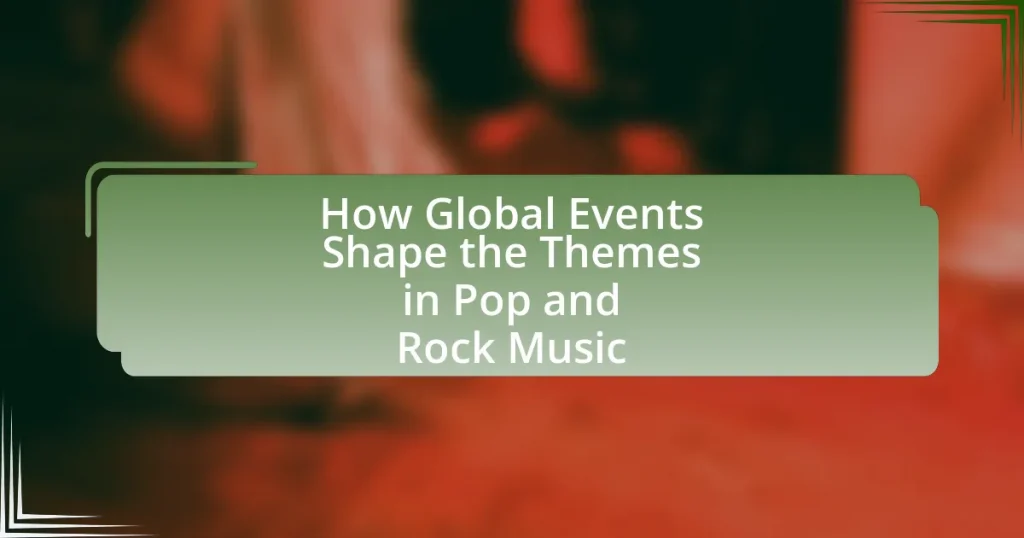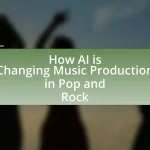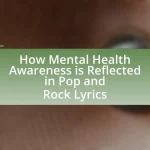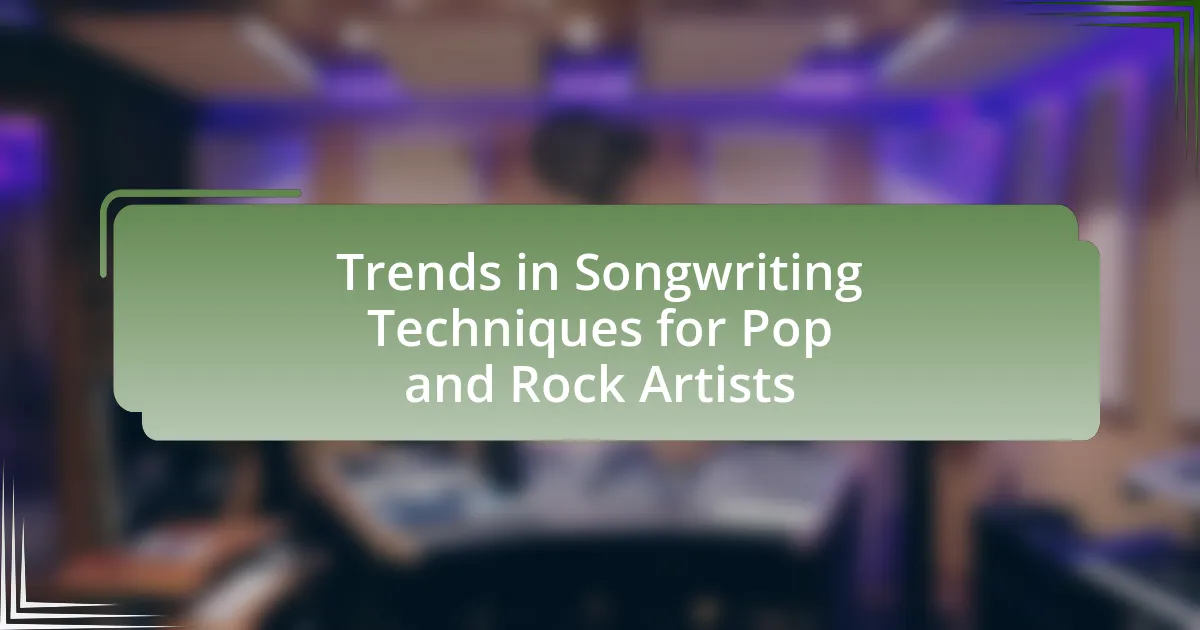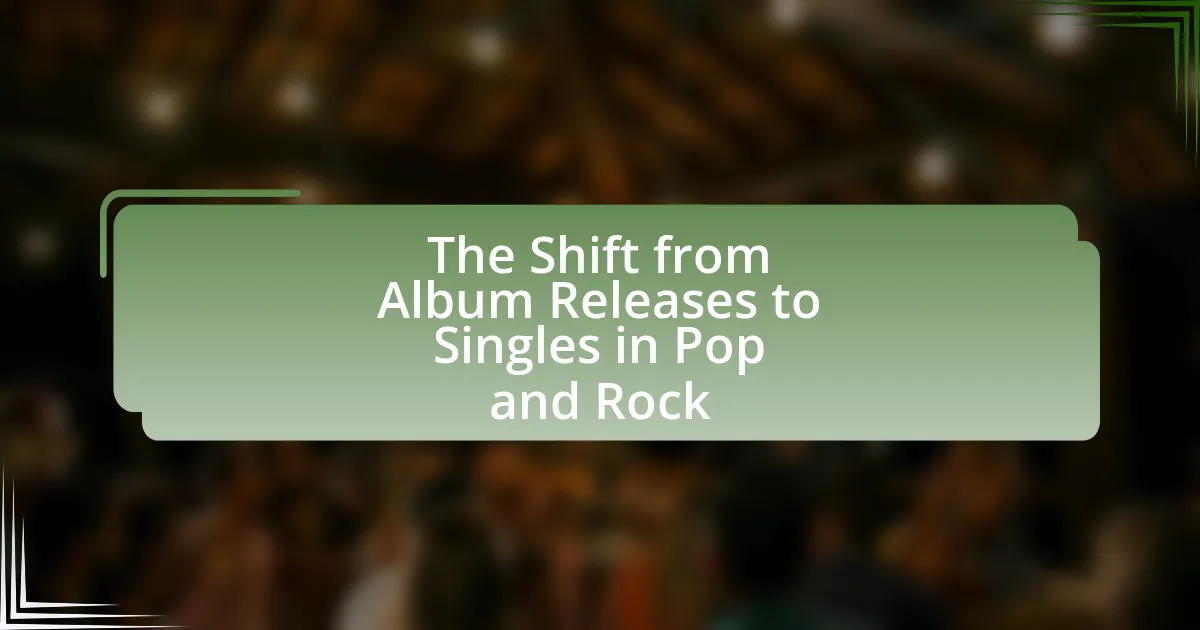The article examines how global events shape the themes in pop and rock music, highlighting the influence of wars, social movements, economic crises, and technological advancements on lyrical content and musical styles. It discusses historical examples, such as the Vietnam War and the civil rights movement, illustrating how artists respond to societal issues through their music. Additionally, the article explores contemporary themes influenced by events like the COVID-19 pandemic and the Black Lives Matter movement, emphasizing the role of music in reflecting societal values, fostering dialogue, and promoting social change.
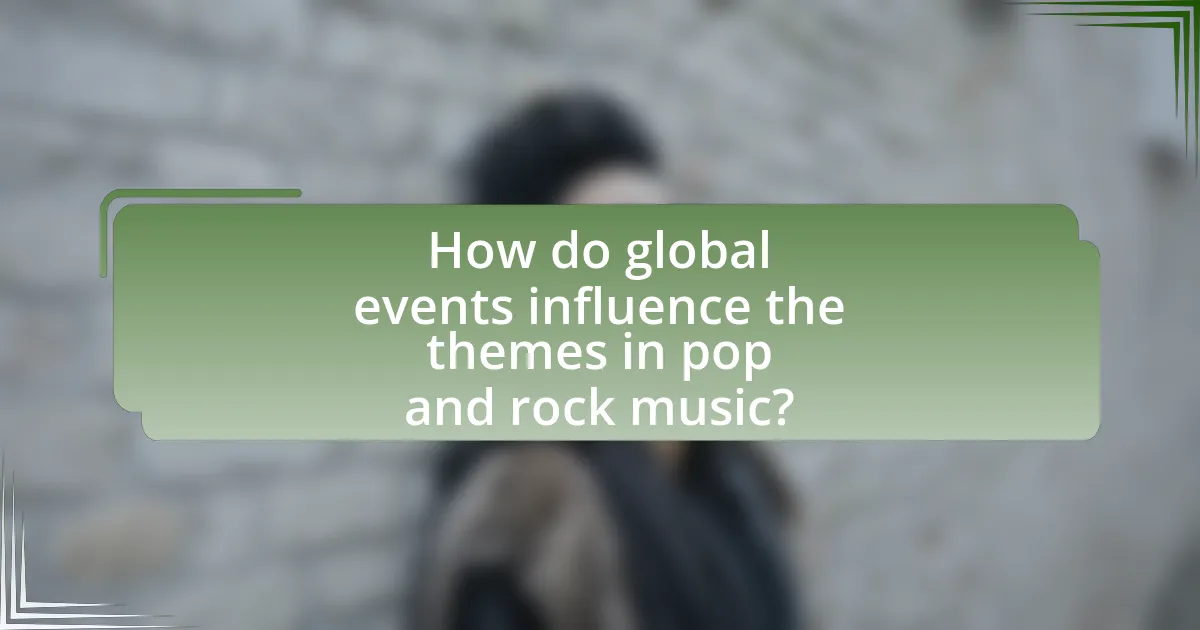
How do global events influence the themes in pop and rock music?
Global events significantly influence the themes in pop and rock music by shaping the cultural and emotional landscape that artists respond to. For instance, during the Vietnam War, songs like “Fortunate Son” by Creedence Clearwater Revival expressed anti-war sentiments, reflecting the societal unrest and opposition to military conflict. Similarly, the September 11 attacks led to a surge in music addressing themes of loss and resilience, as seen in tracks like “Where Is the Love?” by The Black Eyed Peas, which questioned societal issues and promoted unity. These examples illustrate how artists draw inspiration from contemporary events, embedding social commentary and emotional responses into their music, thereby resonating with listeners who share similar experiences or sentiments.
What types of global events have historically impacted music themes?
Global events such as wars, social movements, economic crises, and technological advancements have historically impacted music themes. For instance, World War II influenced the emergence of protest songs and themes of loss and resilience, as seen in works by artists like Woody Guthrie. The civil rights movement in the 1960s inspired powerful anthems advocating for equality, exemplified by songs like “A Change Is Gonna Come” by Sam Cooke. Economic downturns, such as the Great Depression, led to themes of hardship and struggle in music, reflected in the blues genre. Additionally, technological advancements, like the rise of the internet, have transformed music distribution and themes, allowing for diverse global influences to shape contemporary pop and rock music.
How do political events shape lyrical content in pop and rock music?
Political events significantly shape lyrical content in pop and rock music by influencing artists to address social issues, express dissent, and reflect public sentiment. For instance, during the Vietnam War, songs like “Fortunate Son” by Creedence Clearwater Revival criticized the inequities of the draft system, resonating with anti-war sentiments. Similarly, the Black Lives Matter movement has inspired artists such as Kendrick Lamar and H.E.R. to create powerful anthems addressing racial injustice, demonstrating how contemporary political climates directly inform lyrical themes. These examples illustrate that political events serve as catalysts for artistic expression, prompting musicians to engage with pressing societal issues through their lyrics.
What role do social movements play in the evolution of music themes?
Social movements significantly influence the evolution of music themes by providing a platform for artists to express social, political, and cultural issues. For instance, the civil rights movement in the 1960s inspired numerous songs that addressed racial inequality, such as “A Change Is Gonna Come” by Sam Cooke, which became an anthem for change. Similarly, the feminist movement has shaped themes in music, with artists like Joan Baez and later, artists like Beyoncé, using their platforms to advocate for women’s rights and empowerment. These movements not only inspire lyrical content but also affect musical styles and genres, as seen in the emergence of protest songs during the Vietnam War era, which blended folk and rock elements to convey messages of dissent. Thus, social movements serve as catalysts for thematic evolution in music, reflecting and shaping societal values and struggles.
Why is it important to analyze the relationship between global events and music?
Analyzing the relationship between global events and music is important because it reveals how societal issues and cultural shifts influence artistic expression. For instance, music often reflects the sentiments of its time, as seen during the civil rights movement in the 1960s when artists like Bob Dylan and Nina Simone used their platforms to address social injustices. This connection helps to understand the impact of historical events on public consciousness and can provide insight into the collective emotional responses of communities. Furthermore, examining this relationship can highlight how music serves as a form of protest or solidarity, as demonstrated by the anti-war songs during the Vietnam War, which galvanized public opinion and mobilized activism.
How does understanding this relationship enhance our appreciation of music?
Understanding the relationship between global events and the themes in pop and rock music enhances our appreciation of music by providing context for the emotional and social messages conveyed in the songs. This context allows listeners to connect more deeply with the music, as they recognize how artists respond to and reflect societal issues, such as political unrest or cultural shifts. For instance, songs like “Fortunate Son” by Creedence Clearwater Revival emerged during the Vietnam War, capturing the sentiments of a generation opposed to the conflict. This connection between music and historical events enriches the listening experience, making it not just an auditory pleasure but also a reflection of collective human experiences and emotions.
What insights can we gain about society through music themes influenced by global events?
Music themes influenced by global events provide insights into societal values, emotions, and collective experiences. For instance, during times of war, songs often reflect themes of loss, resilience, and protest, as seen in tracks like “Fortunate Son” by Creedence Clearwater Revival, which critiques social inequality during the Vietnam War. Additionally, music responding to events like the COVID-19 pandemic often emphasizes themes of isolation, hope, and community, as demonstrated by songs such as “Lean on Me” by Bill Withers, which gained renewed relevance during lockdowns. These examples illustrate how music serves as a mirror to societal sentiments, revealing how communities process and respond to significant global challenges.
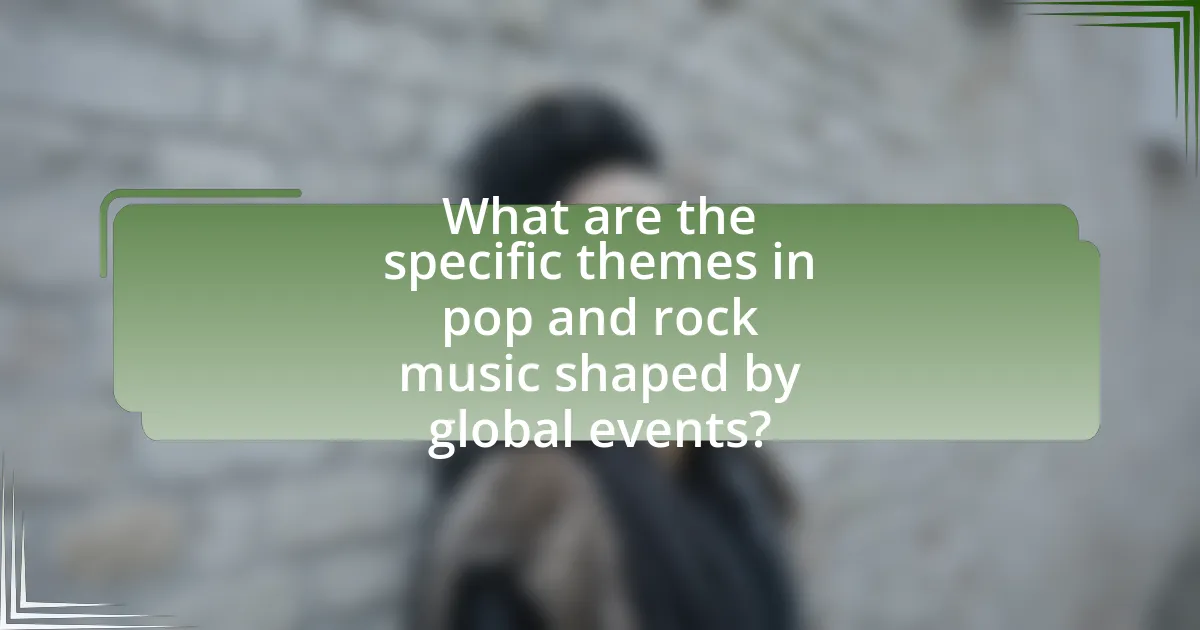
What are the specific themes in pop and rock music shaped by global events?
Specific themes in pop and rock music shaped by global events include social justice, political unrest, and personal struggle. For instance, the civil rights movement in the 1960s inspired songs like “A Change Is Gonna Come” by Sam Cooke, reflecting the fight against racial inequality. Similarly, the Vietnam War influenced rock music, with tracks like “Fortunate Son” by Creedence Clearwater Revival critiquing the socio-political landscape. The rise of global pandemics, such as COVID-19, has also led to themes of isolation and resilience, evident in songs like “I Will Survive” by Gloria Gaynor, which gained renewed relevance during lockdowns. These examples illustrate how global events directly inform the lyrical content and thematic direction of pop and rock music.
How do themes of protest and resistance manifest in music?
Themes of protest and resistance manifest in music through lyrics, genres, and cultural movements that address social injustices and political issues. For example, songs like “Fight the Power” by Public Enemy and “Killing in the Name” by Rage Against the Machine explicitly challenge systemic racism and authority, reflecting the sentiments of marginalized communities. Historically, music has served as a platform for activism, with genres such as folk, punk, and hip-hop often incorporating messages of dissent and calls for change. The impact of global events, such as the Civil Rights Movement or the anti-war protests of the 1960s, has influenced artists to create works that resonate with the struggles of their times, thereby reinforcing the connection between music and social movements.
What are some notable songs that exemplify protest themes?
Notable songs that exemplify protest themes include “Fortunate Son” by Creedence Clearwater Revival, which critiques the Vietnam War and class privilege, and “Fight the Power” by Public Enemy, addressing racial inequality and social injustice. “Killing in the Name” by Rage Against the Machine protests against institutional racism and police brutality. These songs reflect significant social and political issues, resonating with listeners during times of unrest and activism.
How do artists use their platform to address global issues?
Artists use their platform to address global issues by creating music and art that reflects social, political, and environmental concerns. For instance, musicians like Billie Eilish and Childish Gambino have produced songs that tackle topics such as climate change and systemic racism, respectively. Eilish’s song “All the Good Girls Go to Hell” explicitly discusses climate change and its consequences, while Gambino’s “This Is America” critiques gun violence and racial inequality in the United States. These works not only raise awareness but also inspire listeners to engage with these pressing issues, demonstrating the power of art as a catalyst for social change.
What themes of love and unity emerge in response to global crises?
Themes of love and unity that emerge in response to global crises include solidarity, compassion, and resilience. During events such as natural disasters, pandemics, or social upheaval, music often reflects a collective yearning for connection and support among individuals. For instance, during the COVID-19 pandemic, songs like “Lean on Me” by Bill Withers gained renewed popularity, emphasizing the importance of helping one another. Additionally, benefit concerts and collaborative projects, such as “We Are the World,” showcase artists coming together to promote messages of hope and togetherness, reinforcing the idea that love and unity can transcend adversity. These themes resonate deeply in pop and rock music, illustrating how artists respond to societal challenges by fostering a sense of community and shared experience.
How do artists convey messages of hope during difficult times?
Artists convey messages of hope during difficult times through their lyrics, visuals, and performances that emphasize resilience and unity. For instance, during the COVID-19 pandemic, many musicians released songs that highlighted themes of togetherness and perseverance, such as “Lean on Me” by Bill Withers, which became an anthem for support and solidarity. Additionally, visual art and music videos often incorporate uplifting imagery and narratives that inspire optimism, as seen in the works of artists like Taylor Swift, who used her platform to promote messages of hope and healing during social unrest. These artistic expressions serve to uplift audiences, providing comfort and a sense of community in challenging circumstances.
What are examples of songs that promote peace and solidarity?
Examples of songs that promote peace and solidarity include “Imagine” by John Lennon, “One” by U2, and “Heal the World” by Michael Jackson. “Imagine” envisions a world without borders or conflict, advocating for global harmony. “One” emphasizes unity and shared humanity, calling for collective action against division. “Heal the World” encourages listeners to make a difference and foster compassion. These songs reflect the influence of global events, such as social movements and humanitarian crises, shaping their themes of peace and solidarity.
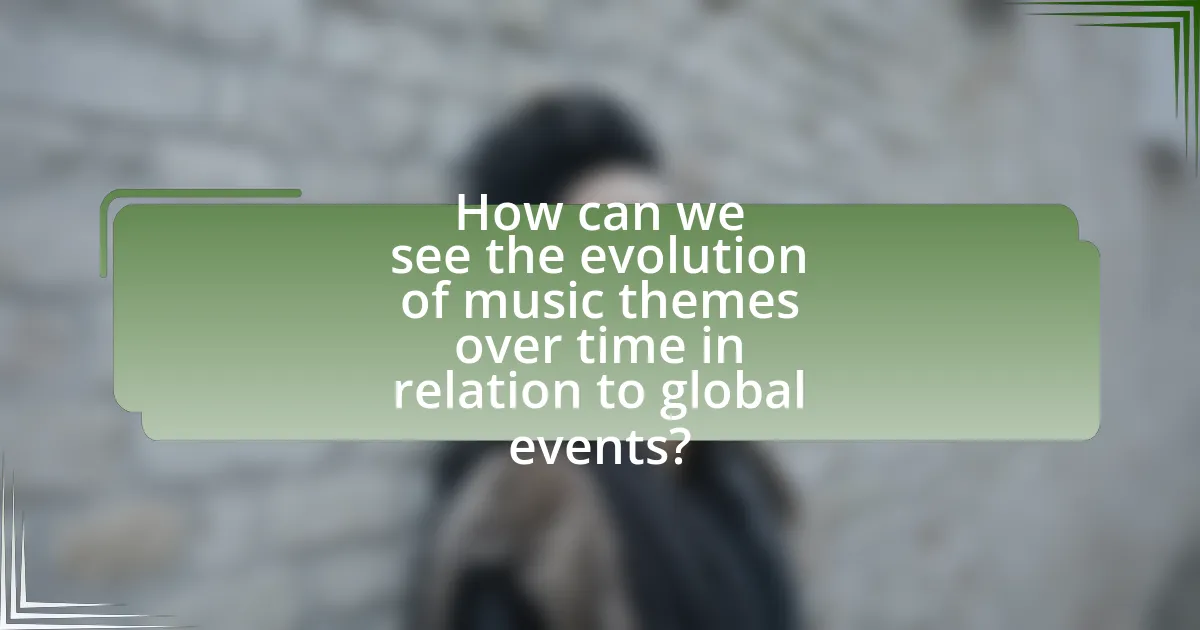
How can we see the evolution of music themes over time in relation to global events?
The evolution of music themes over time in relation to global events can be observed through lyrical content, genre shifts, and the emergence of new musical styles that reflect societal changes. For instance, during the Vietnam War, protest songs like “Fortunate Son” by Creedence Clearwater Revival highlighted anti-war sentiments, while the civil rights movement inspired powerful anthems such as “A Change Is Gonna Come” by Sam Cooke. Additionally, the rise of punk rock in the late 1970s was a direct response to political disillusionment and economic hardship, as seen in bands like The Clash. The impact of global events on music is further evidenced by the way artists respond to contemporary issues, such as the rise of hip-hop in the 1980s and 1990s, which often addressed systemic racism and social injustice. These examples illustrate how music not only reflects but also shapes cultural narratives in response to significant global events.
What historical examples illustrate the evolution of themes in pop and rock music?
The evolution of themes in pop and rock music can be illustrated through several historical examples, notably the impact of the civil rights movement in the 1960s and the anti-war sentiments during the Vietnam War. Artists like Bob Dylan and Joan Baez used their music to address social justice and political issues, with Dylan’s “The Times They Are a-Changin'” becoming an anthem for change. Additionally, the emergence of punk rock in the late 1970s, exemplified by bands like The Clash, reflected disillusionment with government and societal norms, showcasing themes of rebellion and resistance. These examples demonstrate how global events have directly influenced the lyrical content and thematic direction of pop and rock music throughout history.
How did the Vietnam War influence music in the 1960s and 1970s?
The Vietnam War significantly influenced music in the 1960s and 1970s by serving as a catalyst for protest songs and anti-war sentiments. Artists like Bob Dylan and Joan Baez used their music to express opposition to the war, reflecting the widespread disillusionment and social unrest of the era. For instance, Dylan’s “Blowin’ in the Wind” posed poignant questions about peace and freedom, resonating with a generation questioning authority and military involvement. Additionally, the genre of folk rock emerged as a powerful medium for conveying political messages, with songs like “Fortunate Son” by Creedence Clearwater Revival criticizing the class disparities in who was sent to fight. The music of this period not only provided a voice for the anti-war movement but also shaped the cultural landscape, influencing public opinion and fostering a sense of unity among those opposed to the conflict.
What impact did the 9/11 attacks have on music themes in the early 2000s?
The 9/11 attacks significantly shifted music themes in the early 2000s, leading to a rise in songs that addressed issues of fear, loss, and patriotism. Artists began to incorporate themes of resilience and unity in response to the national tragedy, reflecting the collective grief and anxiety experienced by society. For instance, songs like “Where Is the Love?” by The Black Eyed Peas and “American Idiot” by Green Day critiqued societal issues and expressed disillusionment with government actions post-9/11. This thematic evolution was evident across various genres, as musicians sought to process the emotional aftermath of the attacks and engage with the political climate, ultimately reshaping the narrative landscape of pop and rock music during that period.
How do contemporary global events continue to shape music themes today?
Contemporary global events significantly shape music themes today by influencing lyrical content, genre evolution, and artist activism. For instance, the COVID-19 pandemic has led to an increase in songs addressing isolation, mental health, and resilience, as seen in tracks like “I Will Survive” by Gloria Gaynor being reinterpreted in the context of current struggles. Additionally, social movements such as Black Lives Matter have prompted artists to create music that reflects themes of racial justice and equality, exemplified by songs like “This Is America” by Childish Gambino, which critiques systemic racism. Furthermore, geopolitical tensions and climate change have inspired genres like protest music, with artists using their platforms to raise awareness and advocate for change, as demonstrated by Billie Eilish’s “All the Good Girls Go to Hell,” which addresses environmental issues. These examples illustrate how contemporary global events directly influence the thematic direction of music, making it a reflection of societal concerns and cultural shifts.
What current issues are reflected in today’s pop and rock music?
Today’s pop and rock music reflects current issues such as social justice, mental health awareness, and climate change. Artists are increasingly addressing systemic racism and inequality, as seen in songs like “This Is America” by Childish Gambino, which critiques gun violence and racial discrimination. Mental health themes are prevalent, with tracks like “1-800-273-8255” by Logic raising awareness about suicide prevention. Additionally, climate change is a recurring topic, highlighted in songs like “Earth” by Lil Dicky, which calls for environmental action. These themes resonate with listeners, demonstrating how global events shape the narratives within contemporary music.
How are artists responding to the COVID-19 pandemic through their music?
Artists are responding to the COVID-19 pandemic through their music by creating songs that reflect themes of isolation, resilience, and social commentary. Many musicians have released tracks that address the emotional impact of lockdowns, such as loneliness and anxiety, while others focus on hope and unity, encouraging listeners to persevere. For instance, the song “I Will Survive” by Gloria Gaynor saw a resurgence in popularity, symbolizing strength during difficult times. Additionally, artists like Taylor Swift and Hozier have incorporated pandemic-related experiences into their lyrics, showcasing how global events influence their creative expression. This trend highlights the ability of music to serve as both a coping mechanism and a form of social reflection during unprecedented times.
What can listeners learn from the themes in pop and rock music influenced by global events?
Listeners can learn about societal issues, emotional responses, and cultural shifts from the themes in pop and rock music influenced by global events. For instance, songs like “Zombie” by The Cranberries reflect the impact of the Troubles in Northern Ireland, highlighting themes of conflict and loss. Similarly, tracks like “American Idiot” by Green Day critique political disillusionment during the Iraq War, showcasing how artists respond to and interpret global crises. These examples illustrate how music serves as a mirror to societal sentiments, allowing listeners to engage with and understand the complexities of the world around them.
How can music serve as a reflection of societal values and concerns?
Music serves as a reflection of societal values and concerns by encapsulating the emotions, beliefs, and issues prevalent in a given time period. For instance, during the civil rights movement in the 1960s, songs like “A Change Is Gonna Come” by Sam Cooke expressed the struggle for equality and justice, resonating with the societal demand for change. Additionally, contemporary music often addresses issues such as climate change, mental health, and social justice, reflecting current public sentiments and priorities. Research indicates that music can influence and mirror public opinion, as seen in the rise of protest songs during significant political events, demonstrating its role as both a cultural artifact and a catalyst for social awareness.
What role does music play in fostering dialogue about global issues?
Music serves as a powerful medium for fostering dialogue about global issues by conveying messages that resonate emotionally and culturally with diverse audiences. Through lyrics, melodies, and performances, artists address topics such as social justice, climate change, and human rights, prompting listeners to reflect on these critical matters. For instance, songs like “Earth Song” by Michael Jackson and “Fight the Power” by Public Enemy have sparked conversations about environmental degradation and racial inequality, respectively. These musical expressions not only raise awareness but also mobilize communities, as evidenced by the global impact of benefit concerts like Live Aid, which raised funds and awareness for famine relief in Ethiopia. Thus, music acts as a catalyst for discussion and action on pressing global issues, bridging gaps between different cultures and perspectives.
